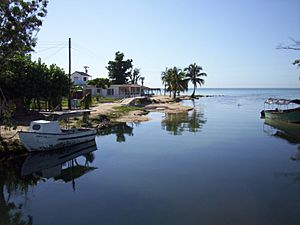Mayabeque River facts for kids
The Mayabeque River (also called Rio Mayabeque in Spanish) is a big river in western Cuba. It's known as the largest river in the southwestern part of Cuba. This river and its many smaller streams flow through several towns like Güines, San Jose de las Lajas, Jaruco, Madruga, and Melena del Sur. An older part of the river in Melena del Sur is called Antiguo Mayabeque. This old section is still good for small boats for about 5 kilometers (3 miles).
The Mayabeque River was the biggest river in the old Havana Province. Today, it's the main river in the Mayabeque Province, which is even named after the river! It flows from north to south. The important and historic city of Güines is located right on its banks. In summer, people enjoy swimming in its cool waters. The river finally reaches the ocean at Mayabeque Beach in Melena del Sur.
Contents
Plants and Wildlife
Along the banks of the Mayabeque River, you can find many different kinds of trees and bushes. One special type of tree is the mangrove. Mangroves give the river's water a reddish color, which is quite unique!
A Look Back in Time
The Mayabeque River was first mentioned in records way back in 1509. This was just 17 years after Christopher Columbus discovered Cuba! At that time, some Native Americans told a Spanish priest about a place further west where some Spanish people were being held captive.
The First Havana Village
Many people believe that the original village of Havana (called San Cristóbal de La Habana back then) was started in 1514 or 1515. It was likely built on the banks of the Mayabeque River, probably on the Antiguo Mayabeque section, just a few kilometers from the southern coast.
Scout Camp by the River
In 1956, the Scouts of Cuba bought a special place for training near Catalina de Güines. This place was called Campo Escuela Nacional Mayabeque, or the National Camp School. It was about 50 kilometers (31 miles) from the capital city. The camp was used to train Scout leaders and for Scouts to go camping. Sadly, the camp was left empty in 1961. Today, that area is underwater because of the Pedroso reservoir.
River Pictures
More to Explore
 In Spanish: Río Mayabeque para niños
In Spanish: Río Mayabeque para niños
 | Dorothy Vaughan |
 | Charles Henry Turner |
 | Hildrus Poindexter |
 | Henry Cecil McBay |








